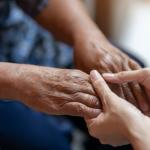
Caring for an elderly loved one, a chronically ill senior, or someone with a disability can be a drain on more than just energy. Caregiving can be a major source of stress and subsequent burnout, especially when provided by an inexperienced family member. Here’s how to prevent caregiver burnout.
One in five Americans serve as a caregiver to a family member or friend who needs support due to disease, disability, or simply growing older. These 53 million informal caregivers in the U.S. provide care over several years, with four being the national average.
Depending on the level of care needed, caregivers can work numerous hours. Approximately 59 percent of family caregivers provide care for 21 hours per week, and about 45 percent provide caregiving services to aging loved ones for 20 hours or less per week.
These caregivers are occupied by a range of caregiving duties on a daily basis, some of which include helping the senior bathe, groom, and get dressed. Family caregivers may cook and help the loved one eat. Maintaining the home and giving medication reminders can keep the caregiver busy.
What is caregiver burnout?
What all these continual, daily responsibilities can amount to is caregiver burnout. Physical, mental, and emotional exhaustion accurately define caregiver burnout when it occurs. Caregivers who experience burnout may no longer feel positive and caring, but rather negative and unconcerned.
Mental health experts warn that caregiver burnout is a taxing psychological condition triggered by unrelieved stress. Caregivers not only deal with the loved one’s illness, but a myriad of other factors, such as financial pressures, changes in family dynamics, and a disruption to family life.
What are symptoms of caregiver burnout?
By the time a family caregiver suspects that she is experiencing caregiver burnout, a host of symptoms are likely to have already appeared. As mentioned, feeling emotionally drained is one red flag of many for caregiver burnout. Overwhelming fatigue can accompany this feeling.
Burned out caregivers’ eating and sleeping habits may change. She may sleep too little or excessively, while weight loss or gain can manifest. An emerging feeling of hopelessness can discolor the caregiver’s outlook on life. The caregiver may also withdraw and lose interest in activities she once enjoyed.
Depression and mood swings are a telltale sign of caregiver burnout. The caregiver may find herself having difficulty coping with everyday challenges. Headaches and stomach aches are common symptoms of burnout. The burned-out caregiver may ultimately feel the senior is controlling her life.

How is caregiver burnout prevented?
1. Accept help
Caregiver burnout does not need to happen, especially given that today’s caregivers have numerous resources at hand. Requesting help from family, friends, and home care agencies is strongly advised and does not make the caregiver appear any less capable of performing her role.
2. Delegate tasks
Delegating tasks is crucial to preventing the family caregiver from burnout. A spouse may cook dinner twice a week, while the family caregiver assumes the caregiving role. A financially savvy cousin may manage the senior’s financial matters. Or, a sibling can sit with the senior one afternoon a week.
3. Find emotional support
A friend or co-worker may be an invaluable source of emotional support, allowing the caregiver to discuss her feelings. Clergy members, social workers, and therapists are professionals trained to help caregivers relieve their stress. Support groups, too, are places to vent and receive encouragement.
4. Understand personal limitations
An overwhelmed caregiver should step back and assess her limitations. Caregivers who know their limits are less likely to overstep them. Setting realistic goals means giving others an opportunity to pitch in. It’s important for caregivers to accept the reality that burnout is a possibility.
5. Practice self-care
Caregivers who take care of their physical health are less likely to succumb to burnout. Eat nutritiously, get an adequate night’s rest, and exercise regularly. Despite being busy, visit the doctor rather than skip appointments. Self-care is not a luxury for family caregivers—it is a necessity.
A part of self-care may be to journal frustrations and struggles, meditate, pray, or stretch. In fact, personal time is so important that waking up 15 to 20 minutes earlier to enjoy it is worthwhile. For instance, relax with a morning cup of coffee or tea and savor it.
6. Take regular breaks
Caregiver breaks are vital to the well-being of the caregiver. Do not sacrifice social connections while caregiving. Rather, visit with friends to maintain the relationships. Taking long baths, getting a massage, or simply stepping out of the house are ways caregivers can reconnect with themselves.
7. Hire respite care
Respite care from home care agencies is available to family caregivers who deserve and need an occasional break from their around-the-clock role. Professional caregivers resume care, while the family caregiver has an opportunity to re-energize, then return to caregiving duties with renewed focus.
When you need relief from providing constant care to an elderly loved one, turn to Assisting Hands Home Care. We offer quality respite care services to give you a much-needed break. Our goal, like yours, is to ensure the continued emotional and physical health of an aging loved one.
Our non-medical care services are comprehensive. We support seniors with the activities of daily living, which include personal hygiene tasks, medication reminders, light housekeeping, meal preparation, transportation to doctors’ offices, fall prevention, and companionship to deter social isolation and loneliness.
Assisting Hands Home Care services may be tailored to meet the unique needs of families and their elderly loved ones. Whether the senior in your life would benefit from Alzheimer’s care, hospice care, respite care, overnight care, or post-surgical care, we will evaluate care needs and customize a care plan.
Families looking for a reliable respite care service are encouraged to consult Assisting Hands Home Care. Our professional caregivers are licensed, bonded, and insured to give families peace of mind.
Call our Schaumburg or Park Ridge, Illinois, location at (847) 796-6685 or visit our website to learn more about our respite care and other senior home care services.




